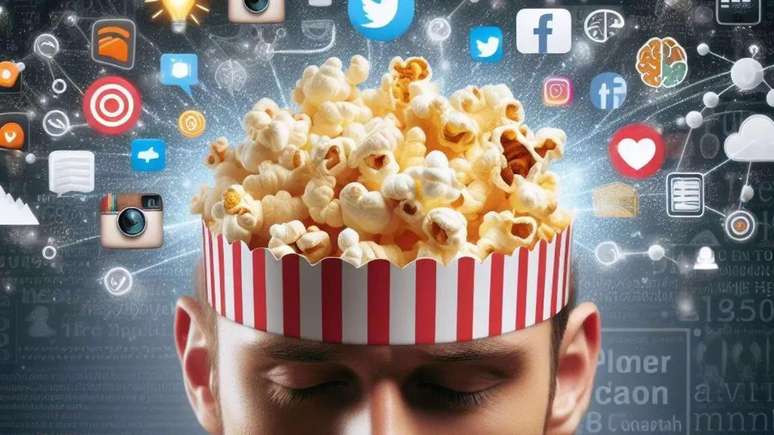The phenomenon can especially affect professionals who work remotely and have recurring access to social networks
Summary
Abusive use of cell phones and social media can impair concentration at work and in life, resulting in the phenomenon known as “popcorn brain.”
It is nothing new that humans have difficulty letting go of their cell phones and that this relationship has affected their concentration in life and work. According to research by Scientific Reports, the mere presence of the device nearby can cause low cognitive performance. This scenario in which the brain is scattered, “popcorning” from one thought, or activity, to another, is known as “popcorn brain.”
This phenomenon is not a clinical term and differs from attention deficit hyperactivity disorder (ADHD). The curious term was coined in 2011 by David Levy, a researcher at the University of Washington Information School. According to American psychologists, the main cause of “popcorn brain” is the abusive use of social networks, applications and other technologies that work like a reward system in the brain.
Among those most affected by this “bad” are professionals who work from home, given the need to always be online, the availability of cell phones at all times and the ease with which distractions occur.
“For remote professionals, who have greater flexibility in their daily lives, inappropriate use of mobile phones can compromise the efficiency of daily tasks and increase turnaround times. Some professionals end up working after hours because they are distracted by their cell phones during the day,” comments Samyra Ramos, marketing manager at Higlobe, a fintech for receiving payments for Brazilian professionals working remotely in the United States.
Symptoms of popcorn brain involve scattered thoughts, disinterest or disconnection from people, quickly switching between topics in conversations, inability to complete tasks, mental exhaustion, and overwhelm. If not resolved, experts explain that such frequent signals can have consequences on physical health, such as headaches, tiredness, interrupted sleep, among others.
“It’s something that happens to everyone, you open your phone to reply to an email, receive a message and distract yourself from the initial goal. These actions can last a few minutes, but they strain the eyes while using the screen, which makes returning to the computer even more tiring,” continues the manager.
Proof of this is that, today, the average ability to concentrate does not exceed 47 seconds, according to psychologist Gloria Mark; just twenty years ago, that time was 2.5 minutes.
To prevent the phenomenon and not get carried away by the thoughts that come out, psychologists suggest dividing daily tasks into small activities; work on regulating the nervous system with meditation, breathing, regular sleep and moderate exercise; and provide “breaks” in the use of screens during the day, especially when waking up and before going to sleep. When you experience increased stress and other health problems that have worsened, it is essential to seek medical help.
Samyra adds: “It is important for professionals to understand that rapid brain rewards, such as social media use, may seem like a rest for the mind, but ultimately lead to fatigue. Establishing strategies such as limiting screen time, carefully selecting goals for the day, and considering keeping your cell phone in another room can lead to a better quality of life and time optimization for these professionals.”
inspires transformation in the world of work, in business, in society. Compasso, a content and connection agency, is born.
Source: Terra
Ben Stock is a lifestyle journalist and author at Gossipify. He writes about topics such as health, wellness, travel, food and home decor. He provides practical advice and inspiration to improve well-being, keeps readers up to date with latest lifestyle news and trends, known for his engaging writing style, in-depth analysis and unique perspectives.









